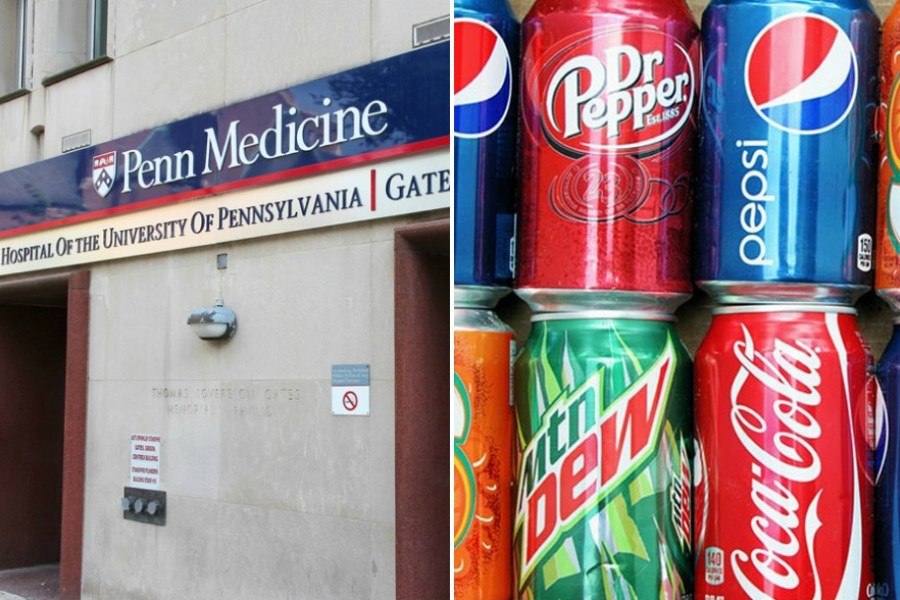Penn Medicine to Stop Serving Sugary Drinks at Its Facilities
The University of Pennsylvania healthcare system will be the first in Philadelphia to eliminate sodas and sports drinks, which have been linked to obesity and chronic diseases.

L: University of Pennsylvania hospital (Penn Medicine) in Philadelphia. tupungato/iStock | R: Photo by NoDerog/iStock
Penn Medicine does not want to buy the world a Coke — or sell it one, either.
The University of Pennsylvania healthcare system has announced that it will soon stop offering sodas, sports drinks, and juices with added sugars in cafes and vending machines at its facilities. The organization says that though such beverages are “staples of many American diets,” they’ve become a major contributor to obesity and chronic disease, like type 2 diabetes, across the nation.
“Penn Medicine is taking strides to eliminate these foods from its facilities in an effort to ensure that the food its serves aligns with its missions to care for, educate and empower patients who are coping with heart disease, diabetes, and many other illnesses,” the organization said in a statement.
The change will occur over the next few months. Diet and unsweetened beverages, 100 percent fruit juice, milk and several flavored-water options will remain available, and patients, staff and visitors can bring their own drinks. Plus, third-party vendors within the hospitals, like Starbucks, can continue to serve beverages of any type.
Federal health agencies say most Americans exceed the recommended daily amount of added sugars. The American Heart Association suggests consuming no more than half of your daily discretionary calorie allowance (which includes the excess calories you consume after your nutritional needs are met). For most American women, that’s less than 100 calories per day, or about 6 teaspoons of sugar per day. For most American men, that’s less than 150 calories per day, or about 9 teaspoons of sugar. Almost half of the added sugar consumed in the U.S. comes from sweetened drinks.
In Philadelphia, where residents suffer from some of the highest rates of diet-related chronic disease in the nation (and where a contentious soda tax passed in 2016), healthcare facilities are working to cut back on added sugars.
At least 16 Philadelphia hospitals have signed up for the Philadelphia Department of Public Health’s “Good Food, Healthy Hospitals” initiative, including several Penn Medicine Hospitals, as well as Thomas Jefferson and Temple University hospitals. The program which encourages caregivers to promote “offer healthier and more sustainable food and beverage options to patients, staff, and visitors every day.”
Good food, good policy, healthy hospitals, healthy patients, healthy families, healthy staff. @GetHealthyPHL is doing good work here. @NYCFoodPolicy tells how: https://t.co/SxIclTveCB pic.twitter.com/n3Q94ep6Qw
— Philadelphia Public Health (@PHLPublicHealth) July 9, 2018
But Penn Medicine will become the first health system in Philadelphia to eliminate sugary drinks.
“As a health system, we aspire to create a model environment for the health and wellness of our patients, their families, and our employees, an effort which extends to the food and drinks we serve in our cafeterias, snack bars, coffee stands, and vending machines,” said Ralph Muller, chief executive officer of the University of Pennsylvania Health System. “Our work to prevent and care for patients with chronic conditions impacted by their diets includes educating them on healthy food and beverage choices — lessons which we believe should be mirrored by what we serve in our facilities.”


